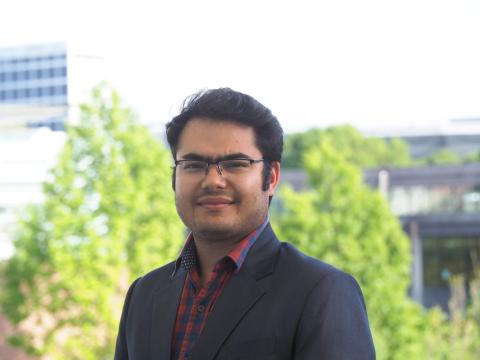ECE Ph.D. student Ananda Samajdar won the silver medal at the ACM Student Research Competition (SRC), held at the 24th ACM International Conference on Architectural Support for Programming Languages and Operating Systems (ASPLOS).
Ananda Samajdar won the silver medal at the ACM Student Research Competition (SRC), held at the 24th ACM International Conference on Architectural Support for Programming Languages and Operating Systems (ASPLOS). The conference took place April 13-17 in Providence, Rhode Island.
A Ph.D. student in the Georgia Tech School of Electrical and Computer Engineering (ECE), Samajdar is a member of the Synergy Lab and is advised by Tushar Krishna. The title of Samajdar’s research presentation was “AIrchitect: Expert AI for accelerator design.” With the end of Moore’s law, heterogeneity in the form of special purpose accelerators is the way forward to continue the trend of performance improvements in hardware. However, accelerator design is hard due to a number of factors. First, obtaining maximum performance by designing custom hardware requires deep domain-specific knowledge about the workload. Second, given a particular application, the design space itself is immense across various form factors. Furthermore, use-cases contribute significantly to design decisions as well.
All of these factors make accelerator design cycle challenging, complex, and iterative. This work tries to tackle these challenges by employing machine learning to automate the architecture design process. Samajdar and his colleagues mapped the architecture design problem to a reinforcement learning setting and employed an evolutionary algorithm to develop neural network models trained for the acceleration design task. In the team's proof of concept experiments, this methodology was successful in developing an expert which can suggest the compute and memory structure for a systolic array-based CNN accelerator in about 100 generations.
The ACM SRC is a prestigious forum for undergraduate and graduate students to present their original research before a panel of judges and attendees at well-known ACM-sponsored and co-sponsored conferences. The competition has three rounds. First, students submit an abstract on an original research idea (not yet published anywhere). Second, selected abstracts are invited for a poster presentation at the conference. Third, based on the poster presentation, a few students are invited for a research presentation in front of a panel of judges.
